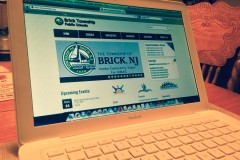Among a number of other regulations, teachers in the Brick Township school district will no longer be able to be friends with their students on social media or call or text them without permission from parents and school administrators.
The board passed its electronic communications policy with six ‘yes’ votes and an abstention from board member Susan Suter, who expressed reservations over the policy and said teachers and students being friends on Facebook and similar sites can be a positive thing that shouldn’t be banned outright.
The policy, which has been in the works since the summer when it was introduced, is mandated by state law. The exact terms of the policy remain up to the district, though multiple layers of legal counsel – from board attorney Jack Sahradnik to attorneys who gave presentations at a recent convention of the New Jersey School Boards Association – advised the board to prohibit teachers from being friends with their students online, Board President Sharon Cantillo said.
|
|
While the policy encompasses a myriad of electronic communication methods (see the chief portions of the policy below), the debate at the meeting Thursday night centered around the issue of students and staff interacting over social media.
“It is not that we think negative about our teachers, we don’t, but we are trying to protect our teachers and go by what we have been advised legally,” said Cantillo.
Suter, however, was not convinced and said it should be up to parents to either allow or disallow students from interacting with their teachers online.
“I feel like this policy is strangling the staff,” said Suter. “I think there should be a waiver on something like that, it’s just how I feel as a parent.”
Suter said her own daughter, a student in the district, is friends with some of her teachers online and the experience has been positive.
“The ones that she’s friends with, they’re very encouraging,” Suter said. “I really, truly as a parent, don’t want to lose that.”
The Brick school district, however, has had its issues in the past with the negative side of online relationships between students and staff, said Dr. Richard Caldes, the former principal of Brick Memorial High School who is now a central administrator with the district.
“Unfortunately, we did encounter some situations where Facebook was used inappropriately,” at Brick Memorial, he said. “You could say it was an isolated incident, but it happened more than once. It did cause some harm to our students because of the inappropriateness that was going on there.”
The inappropriate behavior, he said, also ended up becoming a legal issue for the district.
“In putting this together, we’ve consulted with attorneys,” said board member Karyn Cusanelli. “There has not been anyone who recommends that,” she said, referring to allowing students and staff to be friends in social media. “That was part of the nature of this law being put into place to begin with.”
But while the policy was passed by the board – among other reasons – in order to comply with state law, the policy is a “living document” which can be changed in the future, board member Frank Pannucci, Jr. said.
“I’m comfortable right now to start from the changes we made at the [last] meeting,” said Pannucci.
The policy will likely change as the district completes its adoption of Microsoft SharePoint, a district-controlled social sharing platform where activity between students and staff can be monitored by administrators.
“We have worked very, very hard on this policy, and I would like everyone to understand that it is a work in progress,” said Cantillo. “We are continuing to collaborate on it.”
[divider]Read the proposed policy in full: Draft Policy on Electronic Communication
[divider]Among its chief mandates, the policy:
• Requires that teachers do not use school computer networks for illegal activities, such as copyright infringement, forgery, invading the privacy of others, accessing records which they are not authorized to see, or posting anonymously on websites.
• Requires teachers to e-mail students only through a district e-mail account, which can be monitored by supervisors. Teachers would not be allowed to e-mail students from their personal addresses, and if a student e-mails a teacher at his or her personal address, the teacher would be required to respond from a district address and inform the student that personal e-mails should not be used.
• Prohibits teachers from calling students’ cell phones unless an authorization form allowing the practice has been signed by a student’s parent or guardian and is on file with the district. Teachers are required to limit their conversations to school business only, which is defined as answering questions about assignments and homework, scheduling appointments, clarifying classroom expectations or assignments, and notifying students of deadlines, sports schedules, class trips and other such events. Cell phone contact should be as “brief and direct” as possible.
• Prohibits teachers from sending text messages to students that are outside of class or extracurricular activity business. A signed form from a parent of guardian must be on-hand allowing the communication.
• Prohibits teachers from “improper fraternization” with students over social media. Teachers would be barred from “friending” or communicating in any way with current students over social media unless authorized specifically by the superintendent or if the student is a relative and a form is on file authorizing communication. Teachers, in training sessions, will be reminded to avoid posting content of a sexual nature to social media sites, or items that are considered to be “exhibiting or advocating the use of drugs and alcohol.”
• Instructs the superintendent to periodically conduct Internet searches to see if teachers have posted inappropriate material online. If such content is found, the superintendent must download the material and bring it to the BOE’s personnel committee for review.

Advertisement

Police, Fire & Courts
Grand Jury Indicts Point Pleasant Man, Once a Fugitive, for Attempted Murder









